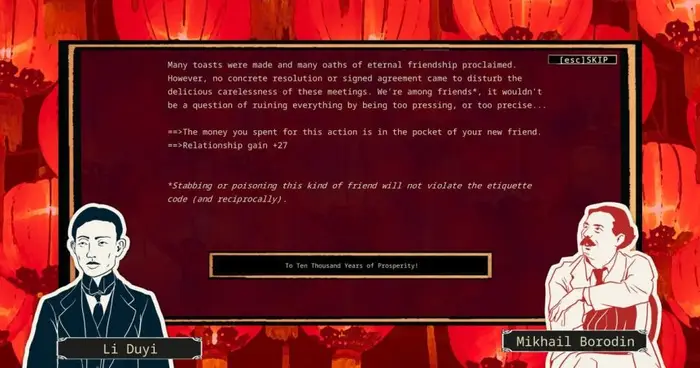A few weeks after discovering new layers and playstyles, the playful faction “China of the 1920s! Lucky!” includes major political blocs, traditional military giants, petty warriors, peasant uprisings, foreigners’ outdoors, and multiple communist cells (particularly the recent DLC). There’s also a police chief. And then there’s my inevitable favorite, an angry mountain woman who doesn’t mind it.
This is an absurdly rich and complicated wargame of grand strategies. But when that means deposits that are usually unruly manageable, the biggest design strength of White Sun is to make it easier to understand and fit it into a framework that is manageable on any scale.
First of all, you don’t I have it To manage your holdings. China is made in the province, dotted with districts, and pays taxes to its owners. Most factions invest in these, build roads and telegraph lines, and establish socioeconomic policies to improve production. However, these require time and resources, and districts are easily captured. Some factions offer better service by accepting low but easy incomes that are indifferent to their opinions and recapture by grabbing them and ignoring them. Some people are actively terrified and looted, while many do all of the above.
Meanwhile, communists can go to half the territoryless game and instead set up underground organizations, slowly winning even in exploited and uncontrolled districts. You can suddenly infuse the stream of extremist supporters as you spend dozens of turns scratching a few followers and get your popularity hints. And instead of giving the Communists a special unit of +10 numbers, the White Sun will revolutionize them as you recruited a Union man, that great hero. Ah, he may run out of things to do, but he was a vital bridge from country cooperation to organized self-defense against warlords, landlords and Gumindhan allies.
.jpg?width=1920&height=1920&fit=bounds&quality=70&format=jpg&auto=webp)
The Union Man is not a unit either. Facts are actually a collection of named (often historical) characters. Many are lonely characters’ perspectives, but you can start with some, and more reserve pools, but without your control, anyone can generate something new at the price. Betrayal is much more likely than 3 or 4, but it is often appealing. Because everything you do requires Qi (energy/action points), and each character gets 4 Qi per turn. A bigger team can simply do more. Move the army, pay, spy, contact potential allies, organize gentlemen, declare Soviets, declare universities, promote opium, reform education, looting, punishing landlords, blame Fentian Creek, paying bandits. There could be an absurd number.
That’s exactly why QI systems work, and why large teams are unstable. Requiring decisions per turn means less overwhelming and less chores. Resources will focus more. Each character gets money, annoying, and “face” through various means that most action is exhausted. largely Also Requires that the character is in the relevant state. It combines with the penalties of provincial opinion (and Northernor/Souszaner division) to put a natural brake on expansion. Some are excellent at generating resources, while others naturally lead to dynamics like recruiting lucky ones in Shaankhshi or sending them from Shanghai to those seeking communists.
This is because each character has a role to determine which actions are accessible. Officers can lead and manage the army, as well as relatively self-sufficient warlords, but he is more prone to becoming worse and corrupt. Politicians are natural district managers who accelerate ongoing projects (who are reluctant to be mad if someone else claims to be a district). Spies can lower the army’s morale and gather intelligence about the enemy. There are theorists, gentlemen, bandits, and others, each of which is potentially critical or useless in different circumstances.
.jpg?width=1920&height=1920&fit=bounds&quality=70&format=jpg&auto=webp)
Many characters have multiple roles, so new spies may come with terrorists and gangs, some will either bribe or assassinate bribes, send another person back to the sanctuary bench or have AI own them. Most characters also have characteristics. The seal of approval of a common “British agent” always has “cold blood.” I can hear a lot. Despite the help screen (wonderfully translated and even conveying light humor), it takes time to master, but you don’t have to learn everything.
This is a very friendly game that radiates knowledge and appeal to the times and a desire to translate it into something familiar, but it’s still different from the rest. For example, thieves are not feed or punishment. They are a natural result of the situation, and some are perennials, not because of some special bandit modifiers, but because the district is a dump. The most noble stewards Plains spare no dozens of Qi needed to bring the barren mountains into slightly poverty. But raising their neighbors, they often form militias and save the hassle.
There are many possibilities, but almost everything is easy to manage. Most districts are understandable at a glance and require little supervision. The scale is huge, but your requests are local. Distant states are hard to win and chase the empire, but it’s not a design flaw, but a governance problem intentionally simulated by the QI system. If you were too stretched to protect the district, you were ambitious. If you didn’t even realize it was gone, you were probably greedy.
.jpg?width=1920&height=1920&fit=bounds&quality=70&format=jpg&auto=webp)
It is rarely managed in combat. There are few rules to memorize beyond the obvious. You absorb well with general considerations rather than calculations when you go, when you go. Combat is instantaneous and mathematics is invisible.
The boring megair of icon shuffle is also not common. flat I have it A worthy standing army requires qualified characters to spin multiple times, but it may gradually reduce escape (unless paid), or starve in poor areas, or turn you on. Winning and movement often means losses and you will want a gun too. Making your own takes several slow steps in huge investments. Or you can withstand smuggling to get your rifle shipment. a Modern The Army requires machine guns and artillery. This means sacrificing the exploitation rights to the power of the empire for the opportunity to meet the weapons dealer. And you could be accused of being a “running dog of imperial power,” and half of China is lined up along with you. As Golog Cavalry or Red Spears or CCPs, you can plunder your hardware by ambushing the grasslands instead or gathering enough farmers to overwhelm them. But it’s all difficult to maintain. The military and campaign tend to be restricted and burn out quickly.
It all naturally limits the Wochore. Moreover, there is no formal peace/war status, as well as fragile loyalty. You can take Yanan, that’s it. In fact, there is no need to count or crush some war points of AI arbitrary claims that they are not owned. As a side effect, small forces can take from the Behemoth without guaranteeing annihilation, allowing them to regain lost districts. Grab a district from allies, as you’ve found a fun way to find some that are switching to your side independently when you just go through. I don’t think “it’s more of my fault, people like me, that’s more of my fault,” but the resulting feud would have been hampered, but I wouldn’t be surprised if someone showed up in the comments and mentioned the historical moment when this really happened.
.jpg?width=1920&height=1920&fit=bounds&quality=70&format=jpg&auto=webp)
Major players like Zhang Zongchang may face more wars, but that’s what impresses you most about Rise of the White Sun. You can choose the part you enjoy. Each scenario simply provides a dedicated story to a few key players, but even the smallest ones get their introductions and goals tailored to their situation. Some people have to prepare before the Japanese and Russians can break in, while big shots need to come back. There is an interesting goal of supporting rivals as part of some broader international schemes. Some people want to control their horns.
Instead of conquering Sichuan, sneaking raiders into Beijing, or crowning their leader and empress, there is nothing to stop them from ignoring them and fighting for influence in Shanghai. I had no chance to hold it, but it forced everyone in China to declare before she went home. But it’s best to play them. The white sun is subtly flooded with historical biographies, events and soft roleplay. Sandbox mode offers a complete conquest option, but certain targets and turn limits are clear. It is intended to enjoy each game as a story of 1-2 days rather than gruel through a long march.
.jpg?width=1920&height=1920&fit=bounds&quality=70&format=jpg&auto=webp)
It’s a crude game, far surpassing its weight, with a modest but engaging presentation (particularly the character portraits). You must allow inconsistent interfaces. It’s partly esoteric – I still don’t have full control over characters with government positions – and there are minor display bugs. Finding people and sects is a hassle. It exacerbates the drawbacks of its major design: the association of distant events is unclear and often unknown due to opaque relationships, and work in the Union is particularly confusing. I reached the end of one story before I knew who my boss was. This is a very interesting way to show how bureaucrats tend to be the same regardless of political stripes.
For all its flavors, the white sun produces no intense revenge or affection. This is a shame. But across multiple games, I have developed some kind of metallurgical relationship and some strange sympathy for some unlikely people. It continues to surprise me. In one scenario that involves format shifting that I don’t ruin. While there are many “what if” sandboxes in the epic strategy, few people marry this many ambitions to facilitate the joy of play and discovery. It is still rare to do it with such infectious enthusiasm for an incredible age. Where else can we change history by promoting grassroots revolutions and maintaining neutrality to separate people from the opium?
(TagStoTRASSLATE) The rise of white sun (T) PC (T) strategy (T) strategy: GRAND strategy/4X (T) rally points








